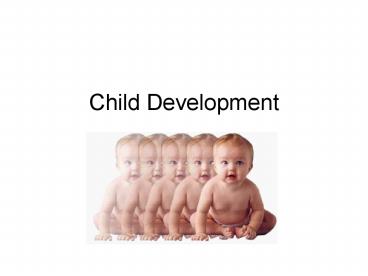Child Development - PowerPoint PPT Presentation
1 / 31
Title:
Child Development
Description:
Child Development Child Development Lecture Outline: What develops? How does it develop? How do we know? What drives development? ----- break----- Nature vs. Nurture? – PowerPoint PPT presentation
Number of Views:118
Avg rating:3.0/5.0
Title: Child Development
1
Child Development
2
Child Development
- Lecture Outline
- What develops?
- How does it develop?
- How do we know?
- What drives development?
- ----- break-----
- Nature vs. Nurture?
- How to make a better baby?
3
What Develops?
4
What do babies have at the start?
- Reflexes
- grasp, sucking
- Perception
- hearing (loudness, pitch, mom)
- vision (brightness, color, faces?) lt 4ft.
- integration of both (head-turns)
5
So, where do they have to get to?
6
How does it develop?
7
How does development happen?
- Differentiation
- cell division
- behavior
- Growth
- bigger brain, bigger body
- more connections
8
How does development happen?
- Orderly and Sequentially
- Motor Development (sit up, crawl,
- walk, etc.)
- LanguageDevelopment (coo, babble, one-word,etc.)
9
How does development happen?
- In stages?
- According to Piaget
- sensory-motor stage (0-2)
- preoperational stage (2-7)
- concrete operations (7-11)
- formal operations (11-on)
10
Sensory-Motor Stage (0-2)
- Child is dealing with
- object permanence (peek-a-boo)
- A not B problem (objects--actions)
- lay physics (magic Baillargeon)
- beginning of representational thought (words
gestures)
11
Preoperational Stage (2-7)
- Child is dealing with
- conservation (liquid, mass, number)
- egocentrism (not in an obnoxious way)
- theory of mind (false-belief, a/r)
- What do these have in common?
12
Formal Concrete Operations
- Child (adolescent) is working on
- mentally relating representations
- (41 odd 61 odd)
- then abstract and hypothetical thoughts
- (any even number 1 odd)
- plus, puberty
13
How do we know?
14
How do we know?
- Sucking (HAS)
- Looking (preferentially)
- Habituation (distinction)
- Pointing
- Answering questions (task demands)
- Affective response (qualitative?)
- Brain imaging (ERPs)
15
What drives development?
16
Mechanisms
- Biological maturation
- gene expression (proteins)
- information processing (packing the trunk)
- Learning
- Piaget-- assimilation and accomodation
- Vygotsky--scaffolding
17
THE BIG DEBATE
- NATURE VS. NURTURE
18
NATURE?
- GENETIC TRANSMISSION
- 23 PAIRS OF CHROMOSOMES
- EACH HAS CA. 1,000 GENES
- GENE PAIRS--recessive/dominant
- POLYGENIC INHERITANCE
19
NATURE?
- FROM GENOTYPE TO PHENOTYPE
- GENES --gt PROTEINS --gt BIOCHEM SEQUENCES --gt
- TRAITS, HORMONES, NEUROCHEMICALS --gt
- CHARACTERISTICS BEHAVIOR
20
What is inherited?
tiger
21
Twin studies
dizygotic
monozygotic
22
NURTURE?
- EARLY EMBRYONIC DEVELOPMENT
- How does each cell with same genes develop
into different parts? - Physical environment! (salamander)
- How does each baby with same structures develop
into different people?
23
NURTURE?
- AFTER BIRTH
- Social environment (family, peers)
- Economic environment
- Cultural environment
- Etc
24
HOW TO MAKE A BETTER BABY
25
In parents the genes
26
Or in the parents hands
27
BETTER?
- Smarter?
- Happier?
- Healthier?
- More creative?
- More athletic?
- Earlier?
28
How?
29
How?
- From rat studies to baby toys
- (Turner Greenough, 1985)
- What about pre-natal Mozart?
- (UC Irvine, 1993)
30
What does the child need?
- nutrition
- stimulation
- care interaction from parent
- certain exposure during sensitive (critical?)
periods - good childcare social interaction
31
What doesnt the child need?
- The perfect experiment
- your homework.































